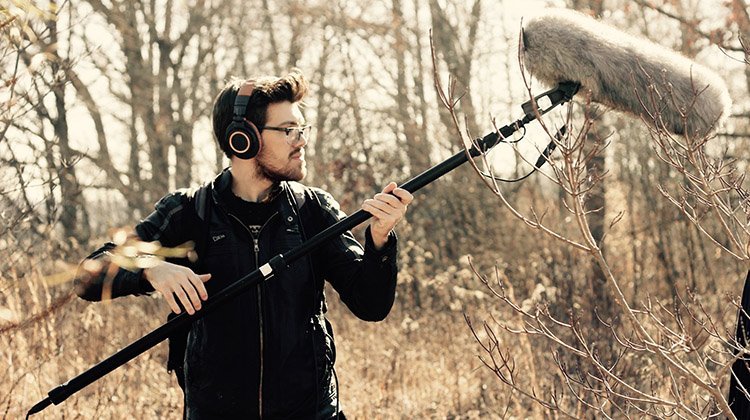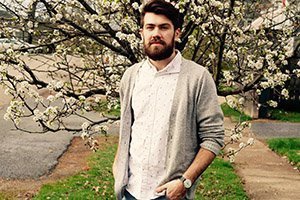Alumnus’ Fulbright Award aims to make language learning, cultural experiences more accessible

Chase Goodwin, BSC ’16, records field audio during the School of Media Arts and Studies’ 2016 48-Hour Shootout, which challenges teams of students to write, film and edit a short film in a 48-hour time period. Photo by Colin Trubee, BSC ’16
Chase Goodwin, BSC ’16, has never been one to give up on his dreams. Even in an Ohio University class of over 200 people, Goodwin made a lasting impression.
“He always stood out as this scrappy, creative student,” Eric Williams, a professor in the School of Media Arts and Studies, said of Chase Goodwin. “He kind of marched to the beat of his own drum.”
Three years after graduating from OHIO, Goodwin’s creativity, tenacity and desire to bring authentic, immersive experiences into traditional learning environments have landed him a prestigious Fulbright Award. This fall, Goodwin will travel to France where he will spend eight months studying and turning his idea of using virtual reality technology to create immersive language learning environments into reality.
“People tend to think of virtual reality exclusively as a niche form of entertainment, but the technology is capable of being so much more than that,” Goodwin said. “It’s a very practical and effective way for people to have experiences unburdened by physical limitations.”
Goodwin began to see the potential of virtual reality while majoring in integrated media and minoring in French as an OHIO undergraduate. He started visiting OHIO’s Game Research and Immersive Design (GRID) Lab as it was about to launch the University’s new virtual reality curriculum. There, he reconnected with Williams, the lab’s immersive storytelling specialist and one of Goodwin’s former professors.
“Chase was one of the students who wanted to start pushing the envelope and try to figure out how you could use this technology in different ways,” Williams explained.

Chase Goodwin, BSC ’16, is preparing to travel to France where he will spend eight months studying and turning his idea of using virtual reality technology to create immersive language learning environments into reality. Photo by Dustin Butcher
Goodwin would share with Williams his ideas about reinforcing classroom foreign language instruction by using virtual reality technology to emerge students in an environment where that language was spoken fluently. Williams would challenge Goodwin’s thought process, encouraging him to more fully develop his idea.
During Goodwin’s senior year, Williams introduced him to Liu YuTao, a visiting instructor from China who had come to Ohio University to learn about virtual reality and 360-degree video. The two worked together on a 360-degree film project, which allowed Goodwin to learn alongside Liu and practice explaining his ideas to other people.
Knowing that an immersive experience is often critical in language learning, Goodwin had wanted to study abroad, but couldn’t afford it. Using virtual reality and 360-degree video, Goodwin realized he could create that immersive environment not only for himself but for other students who couldn’t travel and those in rural and underserved areas, including those in his native Vinton County, Ohio. That environment would allow students to not only experience the French language but also observe facial expressions and mannerisms and be exposed to French culture.
After graduation, Goodwin began looking for ways to turn this idea into action and was encouraged to apply for a Fulbright Award. The Fulbright U.S. Student Program Award is the nation’s largest educational exchange program and seeks to promote cultural diversity and international awareness, which aligned perfectly with Goodwin’s personal mission to make language learning and cultural experiences more accessible.
Goodwin’s road to the Fulbright Award was not easy, however. He applied for the award three times before being accepted.
“In past iterations of the project proposal, I would go back and forth between people saying it’s too technical or it’s too flowery, and I couldn’t figure out the right way to talk about it,” Goodwin said of the application process. He credited Williams, as well as faculty and staff in the Department of Modern Languages and the Office of Nationally Competitive Awards (ONCA), with helping him navigate the process, during which, he said, he “developed more as a person.”
“Working with him, it was clear that his interest in Fulbright was not a desire to further buttress privilege he already enjoys,” Dr. Christopher S. Lewis, director of ONCA, said of Goodwin. “Rather, he is passionate about representing the U.S. Appalachian experience abroad and sharing his experiences as a Fulbrighter in France – and the technology he designs as part of the process – with students in his Vinton County home.”
Goodwin is already using immersive technology in the classrooms at Haugland Learning Center in New Albany where he teaches children and young adults on the autism spectrum. If students in his sciences lessons do well on a quiz on animal habitats, for instance, he uses 360-degree video to allow them to experience the Amazon rainforest. On another occasion, the technology took the students to the surface of Mars as seen from NASA’s Curiosity Rover.
Goodwin has experienced firsthand how these opportunities have positively impacted his students and the potential immersive technology has in making dreams a reality.
“Now that I’m teaching …, I see a lot of students with big dreams that face strong barriers,” he said. “I want to encourage them to pursue those dreams and develop this technology, so that they may circumvent some of those barriers.”
For Williams, Goodwin’s journey to the Fulbright illustrates just how dedicated he is to this project.
“I think (Chase’s project) was a great idea three years ago. I don’t think the rest of the world was ready to hear about 360 video and VR,” Williams said. “He is a visionary, and he was able to stay with his idea long enough for society to catch up with him.”
To read more articles about Ohio University alumni, click here.
